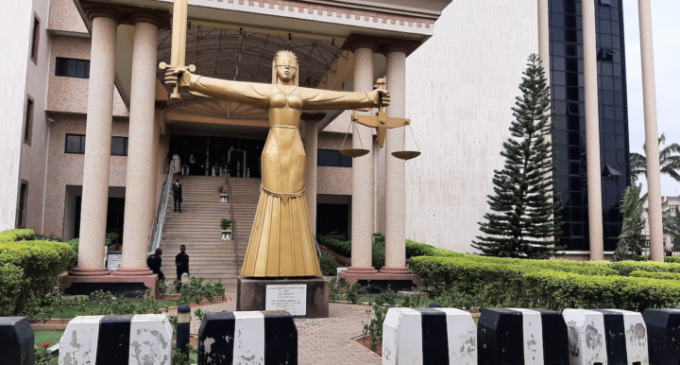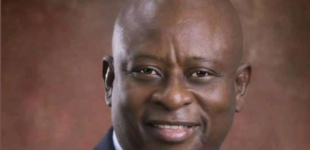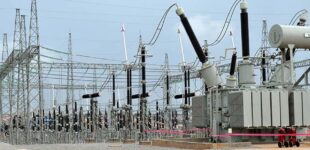EXPLAINER: Is ex parte order freezing accounts of Risevest, Bamboo for 180 days lawful?

On August 17, a federal high court sitting in Abuja granted the request of the Central Bank of Nigeria (CBN) to freeze accounts of six fintech companies for 180 days.
The affected companies include that Rise Vest Technologies Limited, Bamboo Systems Technology Limited, Bamboo Systems Technology Limited OPNS, Chaka Technologies Limited, CTL/Business Expenses, and Trove Technologies Limited.
In a court process seen by TheCable on Tuesday, the apex bank said it is investigating “illegal foreign exchange transactions” by the fintech companies.
CBN submitted that the “illegal” activities of the companies have continually undermined their “efforts to maintain a stable foreign exchange regime which has caused and is causing stable significant economic and financial loss to investors and the financial system in particular and the Nigeria economy in general”.
The apex bank prayed the court to freeze accounts of the fintech companies to allow for investigation into “activities of the defendants/respondents to a logical conclusion”.
WHAT IS AN EX PARTE APPLICATION?
The Latin term ex parte simply means “by or for one party.”
An ex parte application is a motion brought before a court by one party without notice to, and outside the presence of, the other parties in involved in a suit.
DURATION OF AN EX PARTE ORDER
Order 26 of the federal high court civil procedure rules addresses the issue of interlocutory application.
That section discourages the court from granting ex parte applications except the applicant states “sufficient grounds why delay in granting the order sought would entail irreparable damage or serious mischief to the party moving.”
But when the application is granted, Order 26 Rule 10(1)(a) Of the FHC Civil Procedure Rules (2019), prescribes a maximum period of 14 days as the duration of an ex parte order.
10.—(1) An Order made on motion ex- parte may not, unless the Court otherwise directs in the interest of justice, last for—
(a) more than 14 days after the party or person affected by the Order has applied for the Order to be varied or discharged: or (b) another 14 days after application to vary or discharge it has been argued.
Emphasis on the words “unless the Court otherwise directs”. This also means that the 14-day limit is not absolute as the judge is permitted to use discretion in some cases.
DID THE JUDGE CONTRAVENE THE LAW BY GIVING 180 DAYS?
Courts are products of legislative statutes. The jurisdiction of a Court is derived from legislative enactments, and not by the rules of court. Rules of court are only meant to regulate proceedings in the court.
Rules of court regulate proceedings. And when there is a conflict between the rules of court and legislative enactment such as Evidence Act 2011; relevant provisions of CAMA; EFCC Act; ICPC Act; BOFIA; AMCON Act; Terrorism Act]; etc, or even the Constitution, such procedural provisions must prevail.
While the FHC civil process rules stipulate a time frame for ex parte applications, there are categories of ex parte that are not subject to the rules of court neither are they time-bound.
Some of these ex parte applications as listed by Adeola Adedipe, an erudite lawyer, include:
- Ex parte Order For Public Summons, pursuant to Sections 41 & 42 of the Administration of Criminal Justice Act, 2015
- Ex Parte Order as Warrant to Arrest a Ship, pursuant to Section 7 of the Admiralty Jurisdiction Act
- Ex parte Order pursuant to the AMCON Act, for Possession and Interim Forfeiture
- Ex parte Order pursuant to Section 17 of the Advance Fee Fraud and other Fraud Related Offences Act for Non-conviction based Interim Forfeiture
- Ex parte Order pursuant to Section 29 of the Economic and Financial Crimes Commission Act, 2004 for non-conviction based Interim Forfeiture of Assets
- Ex parte Order pursuant to Sections 46, 47 & 48 of the Corrupt Practices and Other Related Offences Act, 2000, for Interim Forfeiture of Assets
- Ex parte Order of Interim attachment, pursuant to Sections 34, 35 & 36 of the National Drug Law Enforcement Agency Act, 2004
- Ex parte Order of Detention, pursuant to Section 27 of the Terrorism Prevention (Amendment)Act, 2013
- Ex parte Order to freeze an account, pursuant to Section 97 of BOFIA. 2020.
- Presidential Executive Order, No. 6, 2018
DOES CBN HAVE THE RIGHT TO CARRY OUT INVESTIGATIONS?
The Banks and Other Financial Institutions Act (BOFIA) 2020 empowers the CBN to carry out investigations with respect to an ex parte order.
With the BOFIA, the CBN can ask the court for more than 14 days to enable them to carry out their investigation.
CBN’s application against the fintech companies was brought “pursuant to order 26 rule 5 (2) of the federal high court (civil procedure) rules 2019, sections 56 (1) and 97(1), (2), &(3) of the Banks and Other Financial Institutions Act (BOFIA) 2020, Memorandum 25(5) (b) of CBN FX Manual 2018 and section 21(3) of Foreign Exchange (Monitoring and Miscellaneous Provisions) Act CAP F34 L.F.N. 2004 and under the inherent jurisdiction of this honourable court.”
However, the powers to investigate are delimited.
Section 97(3) of BOFIA 2020, states that the apex bank must refer the matter to the appropriate agency for investigation.
(3) Where an account has been frozen under this section, the Governor shall refer the matter to the—(a) Nigeria Police Force ; (b) National Drug Law Enforcement Agency ; (c) Economic and Financial Crimes Commission; or (d) any other law enforcement authority or appropriate regulatory authority.
IS THE INVESTIGATION SUPPOSED TO BE CARRIED OUT BEFORE OR AFTER A FREEZING ORDER?
The investigation is to be conducted after the order has been granted by the appropriate court.
Remember that every citizen’s right is enshrined in the constitution. The order is required to interfere with a citizen’s right, because the same cannot be so lawfully done, without judicial intervention or fiat. Section 97 of BOFIA mandates the investigation to be done after such orders have been obtained.
NOT THE FIRST TIME
This is not the first time such an ex parte order has been made.
On November 4, 2020, CBN obtained an order to freeze the accounts of 19 individuals and Gatefield, a public affairs company, all linked to #EndSARS protests for 90 days.
Before the Court order, the apex bank had reportedly instructed banks to place a “Post No Debit” restriction on the accounts of protesters.
Also, in August 2020, the apex bank got an order freezing 65 bank accounts belonging to 12 firms and another individual suspected to be involved in manipulating Nigeria’s foreign exchange market.
There has been an uproar with many concerned about the legality of the orders.
ANY REMEDY AVAILABLE TO DEFENDANTS?
A defendant may apply to the court to hear their application and to show cause why the order earlier granted should be varied or vacated.
Also, if a defendant can prove the CBN failed to refer the matter to relevant agencies for investigation upon the lapse of the specified time, the defendant can sue the apex bank and seek damages.
But before you sue, remember “he that comes to equity must come with clean hands.”

















There are no comments at the moment, do you want to add one?
Write a comment